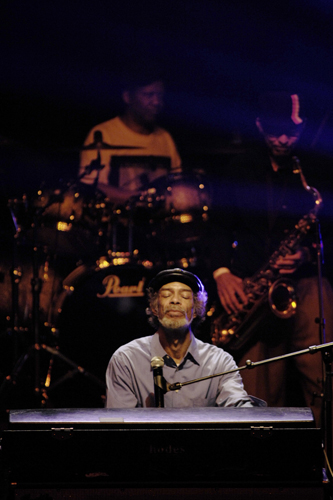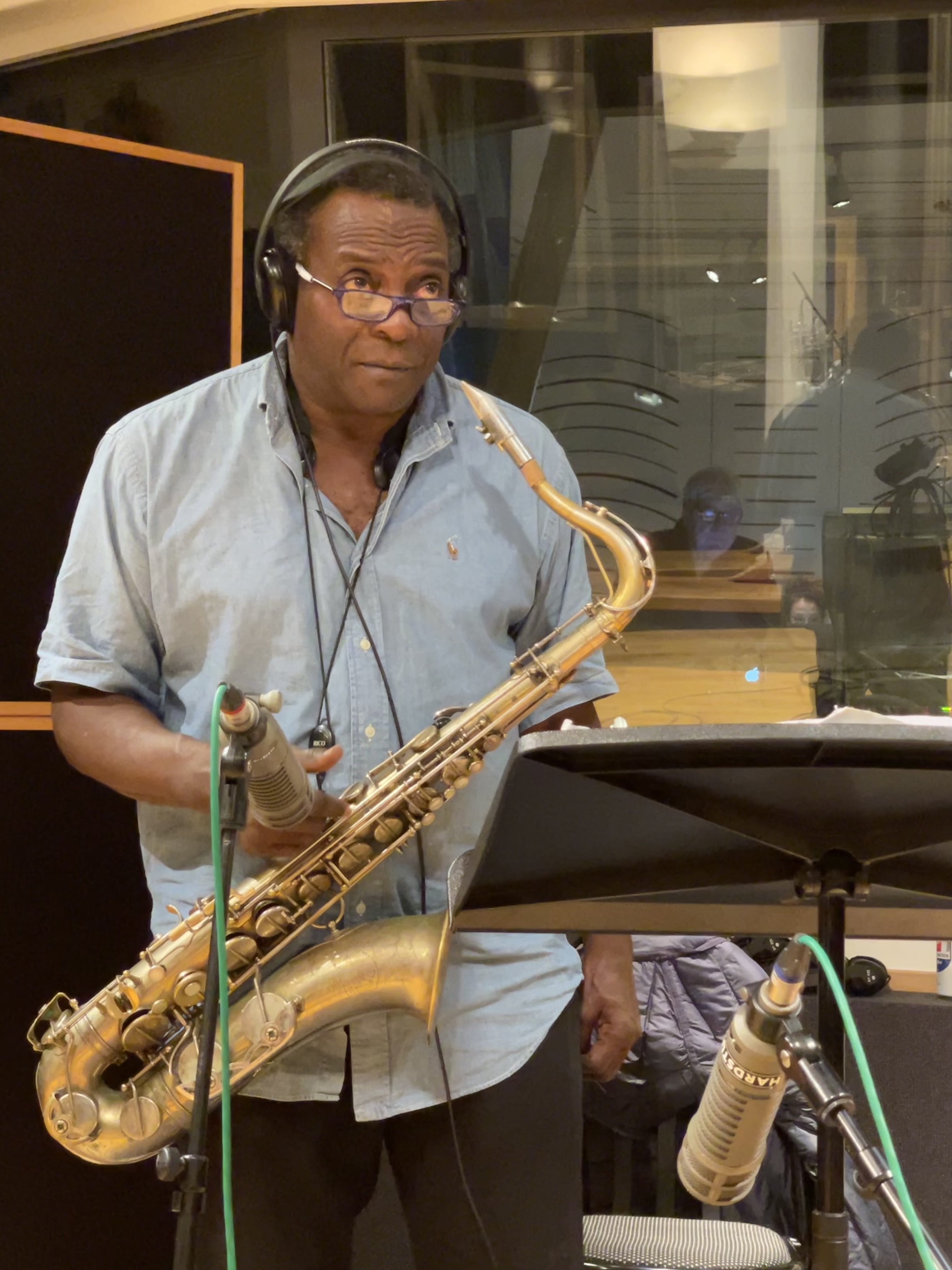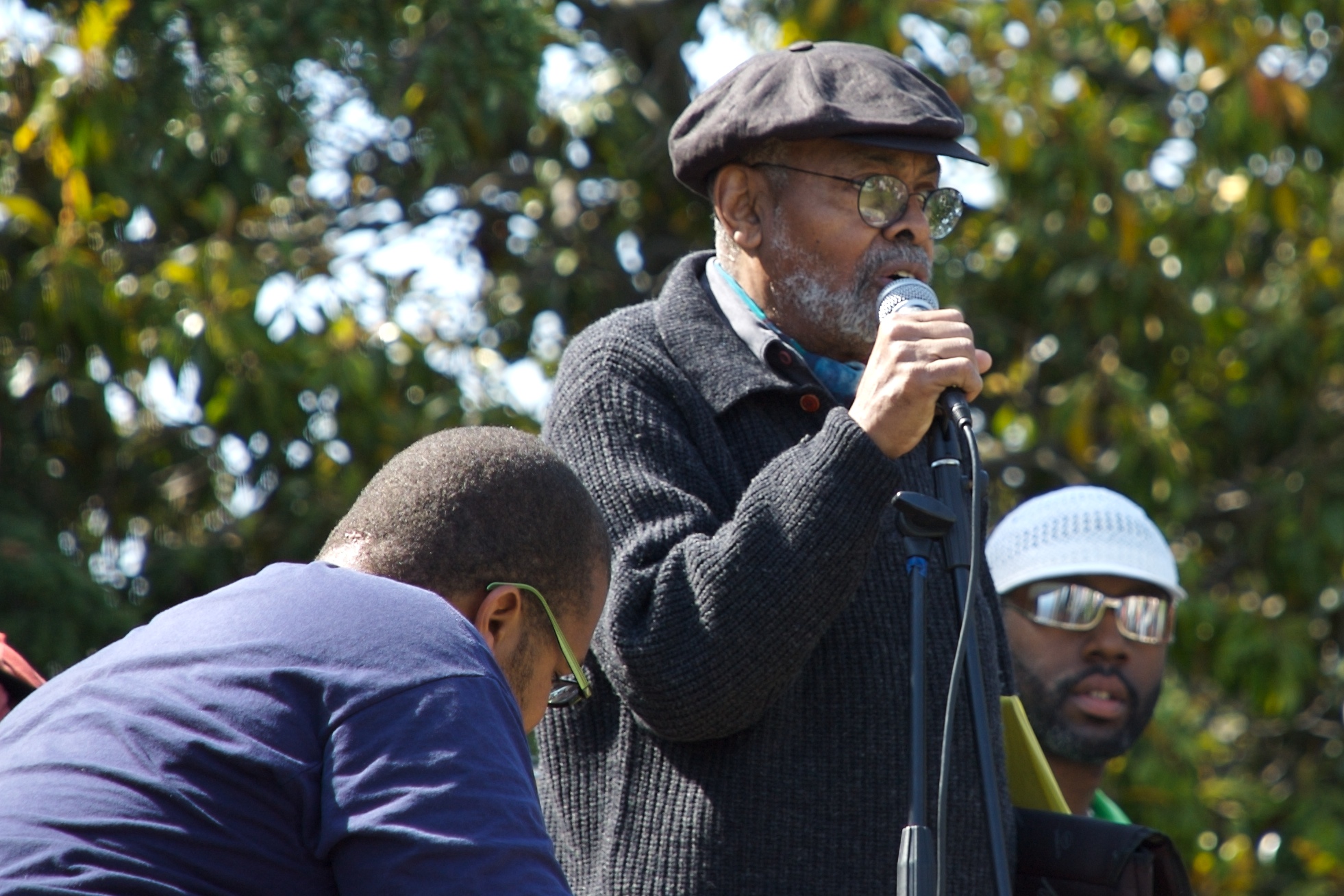|
Jazz Poetry
Jazz poetry has been defined as poetry that "demonstrates jazz-like rhythm or the feel of improvisation" and also as poetry that takes jazz music, musicians, or the jazz milieu as its subject. Some critics consider it a distinct genre though others consider the term to be merely descriptive. Jazz poetry has long been something of an "outsider" art form that exists somewhere outside the mainstream, having been conceived in the 1920s by African Americans, maintained in the 1950s by counterculture poets like those of the Beat generation, and adapted in modern times into hip-hop music and live poetry events known as poetry slams. Aesthetics In his book Digitopia Blues – Race, Technology and the American Voice, poet and saxophonist John Sobol argues that jazz was a transformative vehicle for African-American self-empowerment whose dominant characteristic and purpose was a search for mastery of a language of power, undertaken by a historically enslaved oral people denied access to w ... [...More Info...] [...Related Items...] OR: [Wikipedia] [Google] [Baidu] |
Jazz
Jazz is a music genre that originated in the African-American communities of New Orleans, Louisiana in the late 19th and early 20th centuries, with its roots in blues and ragtime. Since the 1920s Jazz Age, it has been recognized as a major form of musical expression in traditional and popular music. Jazz is characterized by swing and blue notes, complex chords, call and response vocals, polyrhythms and improvisation. Jazz has roots in European harmony and African rhythmic rituals. As jazz spread around the world, it drew on national, regional, and local musical cultures, which gave rise to different styles. New Orleans jazz began in the early 1910s, combining earlier brass band marches, French quadrilles, biguine, ragtime and blues with collective polyphonic improvisation. But jazz did not begin as a single musical tradition in New Orleans or elsewhere. In the 1930s, arranged dance-oriented swing big bands, Kansas City jazz (a hard-swinging, bluesy, improvisationa ... [...More Info...] [...Related Items...] OR: [Wikipedia] [Google] [Baidu] |
Bob Kaufman
Robert Garnell Kaufman (April 18, 1925 – January 12, 1986) was an American Beat poet and surrealist as well as a jazz performance artist and satirist. In France, where his poetry had a large following, he was known as the "black American Rimbaud." Early life and education Born in New Orleans, Louisiana, Kaufman was the 10th of 13 children. His paternal grandfather was a German Jew, and his mother was from an established Black Roman Catholic New Orleans family. His claims that his maternal grandmother practiced voodoo were later refuted. At the age of 18, Kaufman joined the United States Merchant Marine, which he left in the early 1940s to briefly study literature at New York's The New School for Social Research. In New York, reportedly he met William S. Burroughs and Allen Ginsberg. However, Ginsberg has said he did not meet Kaufman until 1959 (Cherkovski, Collected Poems of Bob Kaufman, p. xv). He also knew the photographer Robert Frank in New York in the late 1940s. ... [...More Info...] [...Related Items...] OR: [Wikipedia] [Google] [Baidu] |
Rap Music
Rapping (also rhyming, spitting, emceeing or MCing) is a musical form of vocal delivery that incorporates "rhyme, rhythmic speech, and street vernacular". It is performed or chanted, usually over a backing beat or musical accompaniment. The components of rap include "content" (what is being said), "flow" (rhythm, rhyme), and "delivery" (cadence (music), cadence, tone). Rap differs from spoken-word poetry in that it is usually performed off-time to musical accompaniment. Rap is a primary ingredient of hip hop music commonly associated with that genre; however, the origins of rap predate hip-hop culture by many years. Precursors to modern rap include the West African griot tradition, Cockney rhyming slang, certain vocal styles of blues, jazz, 1960s African-American poetry and ''Sprechgesang''. The use of rap in popular music originated in the Bronx, New York City in the 1970s, alongside the hip hop music, hip hop genre and Hip hop, cultural movement. Rapping developed from the ... [...More Info...] [...Related Items...] OR: [Wikipedia] [Google] [Baidu] |
Gil Scott-Heron
Gilbert Scott-Heron (April 1, 1949 – May 27, 2011) was an American Jazz poetry, jazz poet, singer, musician, and author, known primarily for his work as a spoken-word performer in the 1970s and 1980s. His collaborative efforts with musician Brian Jackson (musician), Brian Jackson featured a musical fusion of jazz, blues, and soul music, soul, as well as lyrical content concerning social and political issues of the time, delivered in both rapping and melismatic vocal styles by Scott-Heron. His own term for himself was "bluesologist", which he defined as "a scientist who is concerned with the origin of the blues".Onstage at the Black Wax Club in Washington, D.C. in 1982, Scott-Heron cited Harlem Renaissance writers Langston Hughes, Sterling Allen Brown, Sterling Brown, Jean Toomer, Countee Cullen and Claude McKay as among those who had "taken the blues as a poetry form" in the 1920s and "fine-tuned it" into a "remarkable art form".Gil Scott-Heron in a live performance in 1982 wi ... [...More Info...] [...Related Items...] OR: [Wikipedia] [Google] [Baidu] |
Fo Deuk Revue
''Fo Deuk Revue'' is an album by David Murray released on the Canadian Justin Time label. Recorded in 1996 and released in 1997, the album features performances by Murray with Darryl Burgee, Ousseynou Diop, Assane Diop, Craig Harris, Robert Irving III, Abdou Karim Mané, Oumar Mboup, Hugh Ragin, Doudou N'Diaye Rose, Moussa Séné, El Hadji Gniancou Sembène and Jamaaladeen Tacuma. The album features a wide array of vocalists including Amiri Baraka, Amiri Baraka Jr. , Didier Awadi and Amadou Barry from Positive Black Soul, Tidiane Gaye, Hamet Maal and Junior Soul. Reception The Allmusic review awarded the album 2.5 stars.Allmusic Review accessed September 8, 2011 Track listing # "Blue Muse" (Irving, Murray) - 8:59 # "Evidence" (Murray) - 5:58 # "One World Family" (Awadi, Barry, Gaye, Murray) - 8:42 # "Too Many Hung ...[...More Info...] [...Related Items...] OR: [Wikipedia] [Google] [Baidu] |
David Murray (saxophonist)
David Keith Murray (born February 19, 1955) is an American jazz saxophonist and composer who performs mostly on tenor and bass clarinet. He has recorded prolifically for many record labels since the mid-1970s. He lives in New York City. Biography Murray was born in Oakland, California, United States. He attended Pomona College for two years as a member of the class of 1977, ultimately receiving an honorary degree in 2012. He was initially influenced by free jazz musicians such as Albert Ayler, Sonny Rollins, Ornette Coleman and Archie Shepp. He gradually evolved a more diverse style in his playing and compositions. Murray set himself apart from most tenor players of his generation by not taking John Coltrane as his model, choosing instead to incorporate elements of mainstream players Coleman Hawkins, Ben Webster and Paul Gonsalves into his mature style. Despite this, he recorded a tribute to Coltrane, ''Octet Plays Trane'', in 1999. He played a set with the Grateful Dead at ... [...More Info...] [...Related Items...] OR: [Wikipedia] [Google] [Baidu] |
Amiri Baraka
Amiri Baraka (born Everett Leroy Jones; October 7, 1934 – January 9, 2014), previously known as LeRoi Jones and Imamu Amear Baraka, was an American writer of poetry, drama, fiction, essays and music criticism. He was the author of numerous books of poetry and taught at several universities, including the University at Buffalo and Stony Brook University. He received the PEN/Beyond Margins Award in 2008 for ''Tales of the Out and the Gone''. Baraka's plays, poetry, and essays have been described by scholars as constituting defining texts for African-American culture. Baraka's career spanned nearly 52 years, and his themes range from black liberation to white racism. His notable poems include "The Music: Reflection on Jazz and Blues", "The Book of Monk", and "New Music, New Poetry", works that draw on topics from the worlds of society, music, and literature. Baraka's poetry and writing have attracted both high praise and condemnation. In the African-American community, some com ... [...More Info...] [...Related Items...] OR: [Wikipedia] [Google] [Baidu] |
Grove Press
Grove Press is an American publishing imprint that was founded in 1947. Imprints include: Black Cat, Evergreen, Venus Library, and Zebra. Barney Rosset purchased the company in 1951 and turned it into an alternative book press in the United States. He partnered with Richard Seaver to bring French literature to the United States. The Atlantic Monthly Press, under the aegis of its publisher, Morgan Entrekin, merged with Grove Press in 1991. Grove later became an imprint of the publisher Grove/Atlantic, Inc. Early years Grove Press was founded in 1947 in Greenwich Village on Grove Street. The original owners only published three books in three years and so sold it to Barney Rosset in 1951 for three thousand dollars. Literary avant-garde Under Rosset's leadership, Grove introduced American readers to European avant-garde literature and theatre, including French authors Alain Robbe-Grillet, Jean Genet, and Eugène Ionesco. In 1954 Grove published Samuel Beckett's play '' Waiting fo ... [...More Info...] [...Related Items...] OR: [Wikipedia] [Google] [Baidu] |
The New American Poetry 1945–1960
''The New American Poetry 1945–1960'' is a poetry anthology edited by Donald Allen and published in 1960. It aimed to pick out the "third generation" of American modernist poets, and included quite a number of poems fresh from the little magazines of the late 1950s. In the longer term it attained a classic status, with critical approval and continuing sales. It was reprinted in 1999. As of 2022, Edward Field and Gary Snyder are the only contributors still living. Overview In 1958, Allen began work on ''The New American Poetry'' anthology. Following the Pound/ Williams tradition, Allen hoped to present the range of experimental writing produced in the United States since the Second World War. The project took two years to complete and required extensive correspondence with poets, editors, and literary agents. The book was finally published in 1960, and, in addition to the poems, included a brief ''Preface'' by Allen, position-statements by some of the contributors, biographical ... [...More Info...] [...Related Items...] OR: [Wikipedia] [Google] [Baidu] |
Five Spot Café
The Five Spot Café was a jazz club located at 5 Cooper Square (1956–1962) in the Bowery neighborhood of New York City, between the Greenwich Village, East and West Village. In 1962, it moved to 2 St. Marks Place until closing in 1967. Its friendly, non-commercial, and low-key atmosphere with affordable drinks and food and cutting edge bebop and progressive jazz attracted a host of avant-garde artists and writers. It was a venue of historic significance as well, a mecca for musicians, both local and out-of-state, who packed the small venue to listen to many of the most creative composers and performers of the era. Early history In 1937, Salvatore Termini (born 1884) purchased what was then known as the Bowery Café, a working-class bar located under the IRT Third Avenue Line, Third Avenue El. In 1946, two of Termini's sons, Joe and Ignatze (Iggy), returned from the war and helped run the bar. In 1951, the sons purchased the business from their father and renamed it the No. 5 Ba ... [...More Info...] [...Related Items...] OR: [Wikipedia] [Google] [Baidu] |
Larry Rivers
Larry Rivers (born Yitzroch Loiza Grossberg) (1923 – 2002) was an American artist, musician, filmmaker, and occasional actor. Considered by many scholars to be the "Godfather" and "Grandfather" of Pop art, he was one of the first artists to merge non-objective, non-narrative art with narrative and objective abstraction. Career Larry Rivers was born as Yitzroch Loiza Grossberg in the Bronx, New York in the family of Jewish immigrants from Ukraine. Rivers took up painting in 1945 and studied at the Hans Hofmann School from 1947–48. He earned a BA in art education from New York University in 1951. His work was quickly acquired by the Museum of Modern Art. A 1953 painting '' Washington Crossing the Delaware'' was damaged in fire at the museum five years later. He was a pop artist of the New York School, reproducing everyday objects of American popular culture as art. He was one of eleven New York artists featured in the opening exhibition at the Terrain Gallery in 195 ... [...More Info...] [...Related Items...] OR: [Wikipedia] [Google] [Baidu] |
Kenneth Koch
Kenneth Koch ( ; 27 February 1925 – 6 July 2002) was an American poet, playwright, and professor, active from the 1950s until his death at age 77. He was a prominent poet of the New York School of poetry. This was a loose group of poets including Frank O'Hara and John Ashbery that eschewed contemporary introspective poetry in favor of an exuberant, cosmopolitan style that drew major inspiration from travel, painting, and music. Life Koch (pronounced ''coke'') was born Jay Kenneth Koch in Cincinnati, Ohio. He began writing poetry at an early age, discovering the work of Shelley and Keats in his teenage years. At the age of 18, he served in WWII as a U.S. Army infantryman in the Philippines. After his service, he attended Harvard University, where he met future New York School poet John Ashbery. After graduating from Harvard in 1948 and moving to New York City, Koch studied for and received his Ph.D. from Columbia University. In 1951, he met his first wife, Janice Elwood, ... [...More Info...] [...Related Items...] OR: [Wikipedia] [Google] [Baidu] |






.jpg)